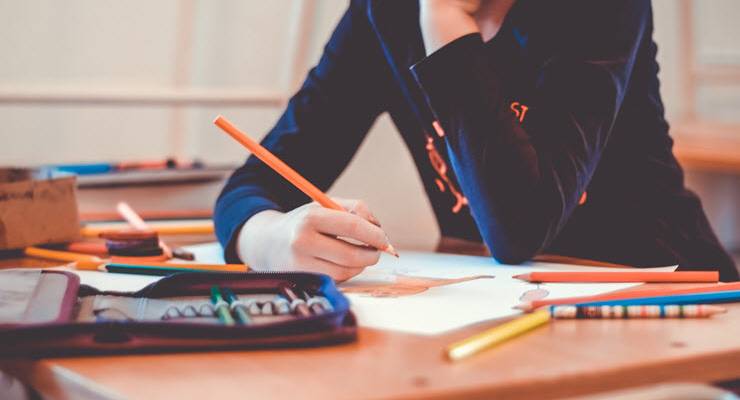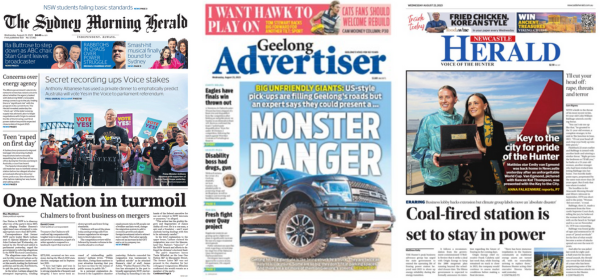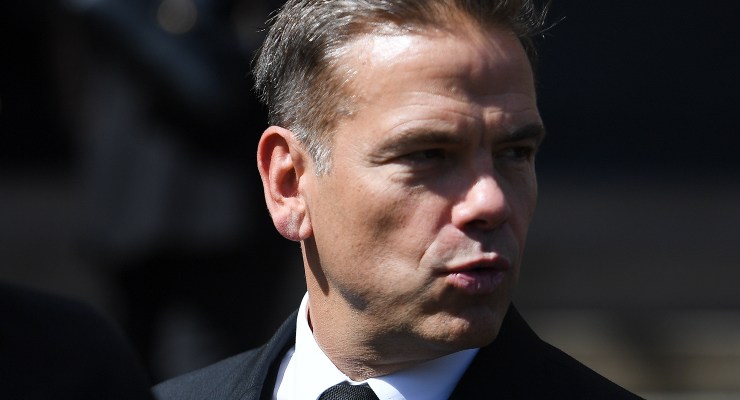
SCHOOL DAZE
Australian kids are twice as likely to fail than excel at maths and English, as The Australian ($) reports, according to the 2023 NAPLAN exam results. By state, about a third of kids failed the tests which look at literacy and numeracy — in Victoria, it was 28.3%, in NSW it was 30.2%, and in WA it was 36.7%. But the NT was much higher, with 60.8% of students either needing more support or “developing”. It comes after tougher national standards became law this year (NAPLAN used to be graded using 10 bands, but now it uses four levels: exceeding, strong, developing and needs additional support, as the SMH ($) explains, because a 2020 review found our minimum was too low compared with other countries). Education Minister Jason Clare vowed to send more money to the most disadvantaged schools via the next National School Reform Agreement, and to back small-group tutoring for more kids (that is already being trialled in Indigenous schools in central Australia).
Meanwhile, one in 10 people aged 15 to 24 who live with a disability left school before 16, new data shows, compared with 3.6% of those without a disability. These are young folks “who acquired disability before age 15”, Guardian Australia adds, and advocates say it shows a lot of schools don’t have the resources to help kids with special needs through to their final year of school. One mother told the paper “shoulder-tapping” — moving kids on after Year 10 — is all too common for Australia’s neuro-diverse kids. Finally, a Ballarat Clarendon College teacher was filmed chastising kids for “some fucking appalling mistakes” and “some absolute dogshit” in their schoolwork, the ABC reports. She resigned. Ah, education in the age of smartphones…
DATE WITH DESTINY
Prime Minister Anthony Albanese will announce the Voice to Parliament referendum date next week, The Australian ($) reports, choosing Adelaide to do so. Why? It’s a must-win state, the paper says, because the No campaign is leading in Western Australia, Queensland and Tasmania while NSW and SA are leaning Yes, and Victoria is on the fence. I guess they’re hoping Victoria will live up to its progressive reputation? It comes as former Liberal MP Pat Farmer ran through Sydney yesterday on a quest to pound the pavement for 14,000km in support of the Voice. Not so positive in the WA Nationals, where MP Merome Beard has broken ranks with her party to support a No vote, The West ($) reports, saying she didn’t have enough detail. WA’s now-abandoned Indigenous heritage laws had left her wary the Voice would help. So she’d prefer to remove any chance it could, rather than give it a shot, presumably.
It comes as federal Nationals Leader David Littleproud and Liberal MPs Bridget Archer and Andrew Bragg have slammed comments from anti-Voice spokesman Gary Johns — that Indigenous people should “learn English” if they want a Voice — as “abhorrent” and “revolting”, Guardian Australia reports. Meanwhile, far-right groups in Australia are copying lines from Kiwi evangelical speaker Julian Batchelor in the Voice to Parliament debate, Guardian Australia reports. Batchelor recently called the Voice “apartheid” on a podcast that has also hosted right extremists such as Blair Cottrell and has made his name back in New Zealand by claiming “the elite Māori takeover” is a “coup by stealth”. Batchelor told the paper he stands with people who oppose “apartheid and racism” and added he couldn’t control what internet users do with his content.
COOKING UP A STORM
It’s a question foodies may be pondering as the country slowly turns away from gas connections — will our dining suffer? Chefs are split, the SMH ($) reports, after the City of Sydney voted to look into banning gas connections in new homes and buildings to slash emissions. Restaurateur Luke Mangan says gas gives you more temperature control, which is important in Asian cuisine. But chef Neil Perry says he’s been using induction since 2006 in Spice Temple and Rockpool kitchens and it is “efficient”, “easier to clean” and gives him more control over the cooking. As for Mangan’s claim about temperature? Perry counters that electric dials give way more accurate information. Victoria has already banned gas connections in new homes from 2024, as Guardian Australia reports. And the state has also made solar panels cheaper for 10,000 more homes — Energy Minister Lily D’Ambrosio is raising the $180,000-a-year income eligibility cap to $210,000, The Age ($) reports, so Victorians can claim a $1400 solar panel rebate.
Some quick headlines in the resource space to finish: BHP says it wants to grow SA copper production by 50%, the AFR ($) reports, to compete in the rapidly approaching renewable mineral boom. It comes after the fossil-fuel giant completed a $9.6 billion OZ Minerals takeover. Also in the Fin ($) this morning: gas pipelines owner APA Group is about to make its biggest investment in electricity generation and battery storage assets (some $1.5 billion) by buying Alinta Energy’s Pilbara portfolio — that’s the Port Hedland and Newman power stations, the Chichester solar farm, and Goldfields gas transmission pipeline, as the paper lists.
ON A LIGHTER NOTE
Hope is a hell of a drug — just ask US writer Aria Vega, who was in her late 20s, living with her parents, trying to make it as a writer and in desperate need of a rental home to call her own. She was perusing a classifieds site when she spotted a real estate unicorn — a little cottage with a leafy backdrop, asking just US$700 for a deposit, without a stair in sight. Vega was recovering from a workplace accident that had left her requiring a cane to walk, and to find a rental property that didn’t involve painful hobbling up and down a staircase was like a mirage. She was practically getting her credit card out when her mum suggested they see the place first. They jumped in the car, talking excitedly the whole way, only to be met with a “For Sale” sign planted square in the front yard. Vega’s heart sank — the ad was a con, she realised, with an apologetic neighbour confirming it.
The crestfallen pair snooped around the cottage anyway, peering in the windows to peek at the glossy hardwood floors, new fridge and French doors in the main bedroom — the “perfect little house” for her. Vega returned to her folks’ home “mourning the quiet country life I’d let myself envision”, as she writes for The Guardian. Her mum, experiencing a stab of second-hand parental devastation, piped up that they should check the asking price anyway. Amazingly, buying it worked out to be more affordable than renting — about US$280 a week in repayments, as long as her parents co-signed. Vega had never let herself believe she’d buy — it felt like “a luxury to consider only if I struck it rich somehow” — and was deeply humbled her parents could help. She’s since moved into her little cottage and still feels a sense of wonder that a near-miss on a scam turned into a home to call one’s own. No small step (up any stairs, either).
Hoping you’re clear-eyed during your Wednesday morning and beyond.
SAY WHAT?
Our future is not in American glitz and red Trumpian hats or a political diet of anger. It is found in serving the decent aspirations of Australians and … in the breadth of our national life and not in the political culture of dividing it.
Julian Leeser
The Liberal MP and former opposition spokesman for Indigenous Australians, who resigned from the frontbench in support of the Voice to Parliament, says the Liberals need to stop indulging the fringe and focus on middle Australians to win the votes of women, multicultural groups and young people.
CRIKEY RECAP
“Lachlan Murdoch has stumped up more than $1.3 million in legal costs incurred by Private Media, publisher of Crikey, throughout the duration of the publisher’s defence, concluding one of Australia’s highest-profile defamation battles in recent memory.
“In a letter sent on August 14, Murdoch through his lawyer agreed to cover Private Media’s costs of $1.3 million in full — more than the $1.1 million asked for — on the condition the company donate all $588,735 secured from supporters of its GoFundMe defence fund to the Alliance for Journalists’ Freedom.”
“So [Margaret] Gardner’s views were always going to be read with interest, inside the sector and in the corridors in Canberra. After all, her partner, Glyn Davis, secretary of the Department of Prime Minister and Cabinet, is one of the most powerful men in the federal government. Interestingly, there was a crucial fact that Gardner didn’t mention in her Lens article: the wage theft on her own watch.
“While Gardner was vice-chancellor in 2021, the then-boss of Australia’s largest university admitted to more than $8.6 million of underpayments to casual academic staff. Over six years, more than 2000 teachers had wages and entitlements withheld. As an academic and union representative at Monash University, I had some thoughts about this. At a minimum, an essay by the vice-chancellor of a university should be a topic of open debate. But when I contacted the editors of Lens to submit a reply …”
“[Rupert] Murdoch’s real stroke of genius, however, was to realise the unfulfilled potential of using television to exploit white grievance and victimhood, an emerging market in the 1990s that other media, notably radio, had previously sought to exploit, especially after the Federal Communications Commission in 1987 had rescinded the ‘fairness doctrine’.
“This wasn’t a market created by Murdoch and Fox News, but by the economic and social consequences of the neoliberal revolution ushered in by governments around the anglophone world in the 1980s (with Murdoch’s support), which offshored blue-collar jobs, empowered corporations, encouraged globalisation and freedom of movement of people and capital, reduced social safety nets …”
READ ALL ABOUT IT
Iran unveils attack drone capable of striking Israel (Al Jazeera)
Scotland still has Europe’s highest drugs deaths, new figures show (euronews)
Greece discovers 18 charred bodies as southern Europe wildfires spread (Reuters)
Activist behind Supreme Court affirmative-action cases is now suing law firms (The Wall Street Journal) ($)
[Ex-PM] Thaksin Shinawatra jailed on return to Thailand as his party regains power (The Guardian)
Mesh surgeries to be halted in New Zealand because of safety concerns (NZ Herald)
THE COMMENTARIAT
Murray-Darling Basin plan to be extended under a new agreement, without Victoria — but an uphill battle lies ahead — Jamie Pittock (The Conversation): “[Tanya] Plibersek appears to be counting on her alliance with other states enabling required amendments to the Water Act and Basin plan to be passed before Christmas. Given almost certain rejection by the opposition of more water reallocation, she will require the support of crossbench senators who may demand stronger environmental measures. The Greens have already criticised the minister’s announcement as a move that ‘kicks the can down the road’, but buying such a large volume of water will take years.
“If the legislation is not amended, and existing deadlines remain, the federal government may be forced into recovering even more water. In particular, they would need to respond to the states’ failure to deliver on projects that are supposed to conserve wetland with less water by building water supply infrastructure. The new agreement is welcome in doubling down on the original plan to recover 3200 billion litres a year of additional water essential to maintain the health of the rivers and the people who rely on them. The federal government has focused on recovering 450 billion litres a year of water within this target that was agreed with the former South Australian premier.”
NAPLAN benchmarks have changed, but bad results stay the same — Jordana Hunter and Nick Parkinson (The AFR) ($): “One way governments can help is to ensure all schools have access to high-quality, comprehensive sequences of curriculum materials that build knowledge and skills across year levels. A 2022 Grattan Institute survey of more than 2200 Australian teachers and school leaders found that only 15% of teachers had access to such materials for all the subjects they teach. Australian teachers deserve world-class materials to help them plan, just as their students deserve to be taught with world-class materials. Establishing an independent body to quality-assure comprehensive sequences of curriculum materials would give schools confidence that any materials they select are grounded in evidence, rather than educational fads, vague promises or glossy marketing.
“Given NAPLAN’s sobering results, it is also clear much more needs to be done to identify struggling students early. It is too late to wait until the Year 3 NAPLAN tests to find out that one in three students has failed to meet expectations. As a first step, education ministers should introduce a nationally consistent Year 1 phonics check, to systematically identify students who struggle with essential early literacy skills. England adopted this approach in 2012, and its reading results have improved markedly since. International research also shows the benefits of targeted intervention for struggling students through an ‘extra dose’ of teaching, such as small-group tutoring.”
HOLD THE FRONT PAGE

WHAT’S ON TODAY
Online
-
Environmental journalist Jeff Goodell will talk about his new book, Heat, in a webinar held by The Australia Institute.
Yuggera and Turrbal Country (also known as Brisbane)
-
Architects Stuart Vokes and Aaron Peters will chat about their new book, Migrations from Memory, at Avid Reader bookshop.
Kulin Nation Country (also known as Melbourne)
-
Writer Polly Barton will speak about porn, sexuality and enduring taboos in a talk at The Wheeler Centre.









Beware the ides of October?
As for the disingenuous, “Please explain” flat-earther NO shows – with their “not enough information” – just how much weight of “information” would it take to seep through their impervious leaden curtain?
Years ago, had ex-“Labor luminaries” Gary Johns and Mark “integritty’ Latham drunk from the same “Fountain of Troof”?